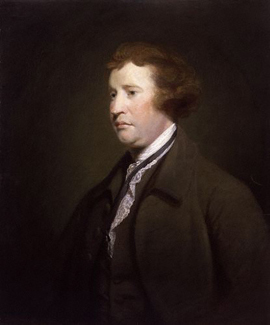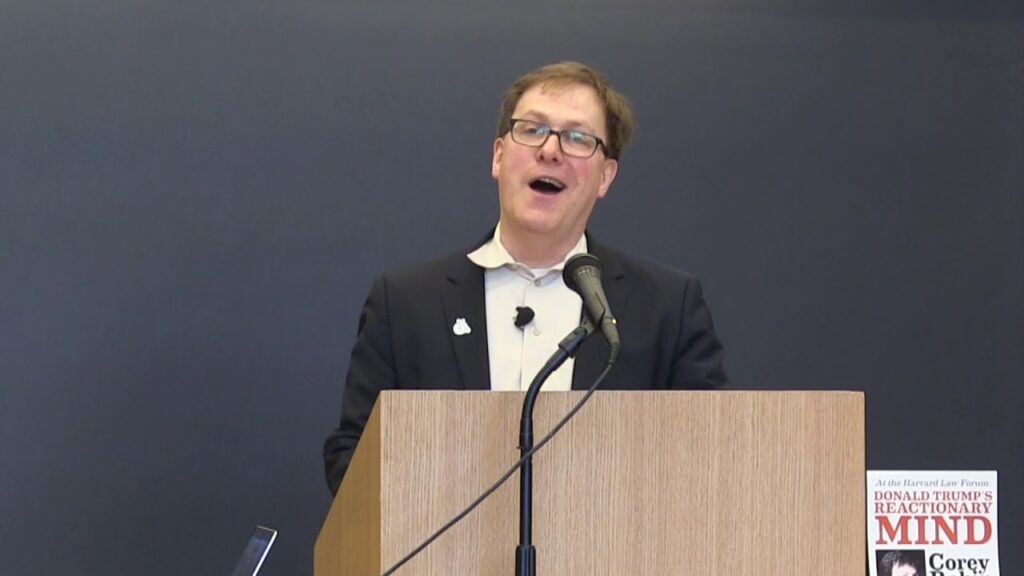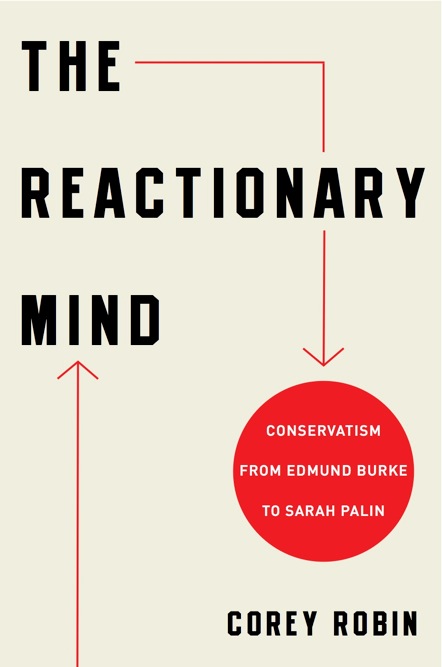In his latest book, The Reactionary Mind: Conservatism from Edmund Burke to Sarah Palin, Corey Robin attempts to define the essence of conservatism. Eschewing the usual clichés, Robin argues that conservatism is essentially a counterrevolutionary force against disempowered people who try to upend established power structures. Web editor David V. Johnson talked to Robin the day after Super Tuesday about why Republicans obsess over contraception, why the Tea Party beat the left to the punch after the financial crisis, and why Burke’s work on the sublime offers a key to unlocking conservatism.
 Edmund Burke
Edmund Burke
David Johnson: Your book argues that what characterizes conservatism essentially is its advocacy of hierarchical regimes of power and restricting the agency of subordinate classes. Some conservatives might admit that this is a byproduct of conservatism but would counter that it’s really about limited government and advocacy of human freedom, or the stability of important institutions, or some other guiding principle. Why should we think that you’re right and conservatives are wrong?
Corey Robin: In trying to figure out what is conservatism, I first looked at conservative anthologies, especially ones that are published by conservative outlets. Of course, they’re different, and not all of them emphasize the same thinkers, but there’s a considerable amount of overlap among them. And what I found is that many conservative thinkers actually don’t make the case for limited government or for traditionalism; they make quite different arguments. Now some of them do; don’t get me wrong, I’m not denying that. But that position is not nearly as widespread as you might think. Those features or specific positions that people think of as uniting the conservative cause just don’t account for its differences across time and space.
Second—and here I think historians can be very helpful to us, because academic political theorists in particular forget this point—conservatism is first and foremost not an analytical tradition but a philosophy of political practice, by its own terms. (Let’s not forget: one of Edmund Burke’s great arguments against the revolutionaries in France is that they are philosophical idealists, whereas his is a philosophy of praxis. And I think that we should hold conservatives to that self-understanding, because I think there’s a considerable amount of truth to it. So if that’s the case, then let’s look also at the practice.) Conservatism is an ideology with a certain periodicity; it has moments where it rises and crests. And those moments where conservatism has been most mobilized, whether at the elite or popular levels, are always moments of political reaction or moments when it’s trying to confront an insurgent, democratic movement from below.
What are the great causes of the conservative intellectual tradition? Opposition to the French Revolution and then, I might also add, all the revolutions that the French Revolution sparked. In Britain, the extension of the franchise was a huge, huge battle. Opposition to the rise of labor unions. Opposition to the Soviet Union and everything from Bolshevik revolutionary socialism to the mildest form of welfare state. Opposition to the civil rights movement. Opposition to feminism. Those are the kinds of historical touchstones that you have to look at in order to understand a lot of the arguments that conservatives mobilize. This is why I think a lot of academic political theorists think: “Edmund Burke, Michael Oakeshott, Robert Nozick . . .” as if conservatism is a timeless tradition that isn’t, by its own self-understanding, extraordinarily engaged and responsive to the immediacies and challenges of a specific context.
DJ: Reading your book reminded me of the forum on libertarianism we had recently with Harvard political philosopher Tim Scanlon. Like him, you argue that there is a disconnect between what conservatives claim are their fundamental values and what they advocate on the basis of them. There’s something deeper at work, and the values that they espouse aren’t fundamental—they’re more epiphenomenal, rhetorical, or ideological.
CR: Here’s where we need to be careful, because I think that is how some people have read my book, and I can see why they have read it that way, but it’s not how I conceive of what I’m trying to do. I am not trying to make the case that there’s some deeper structure of motivation that is psychically inspiring or pushing conservatives to say X because it’s a palatable way of hiding Y. That’s a perfectly legitimately argument to make, and people do make it, and in all honesty, a lot of the historiography would bear that out. But that’s not the argument I’m making. Nor am I making Scanlon’s type of argument. I’m not trained in analytic philosophy.
I actually do try to work with the texts as they present themselves. As I said in my response to Mark Lilla’s review, making the argument I make about conservatism didn’t require a lot of digging. I’m not going deep into the archives to find the secret structure of conservative thought. I look at the standard texts, and find that we’ve overlooked a lot of the arguments that are there for anyone to see. They’re all there. Sometimes the idea is in plain sight, sometimes you have to be alert to the movement of the idea as it works itself out in the text, but my way of reading is simply that of an alert literary critic, basically—as well as that of a historically trained political theorist, who’s mindful of the resonance of ideas across time—and that’s how I find these arguments.
For instance, I look at Barry Goldwater’s The Conscience of a Conservative. Now that was a political tract written eventually for a presidential campaign. And people focus on a couple of sentences, but they don’t read the damn thing. Or Burke—they don’t read a lot of the things that he wrote about the French Revolution and how he made the arguments. So I’m a kind of old-fashioned reader of the text. There’s nothing fancy in my methods, there’s no Marxist or Frankfurt School–style critique or anything like that.
DJ: I was surprised that you got so much mileage out of Burke’s work on the sublime [A Philosophical Enquiry into the Origin of Our Ideas of the Sublime and Beautiful]. Why should we use this text to understand Burke’s political views?
CR: It’s a great question. First of all, it’s the text where Burke most develops a theory of moral psychology, of human nature, where he really lays it out, I think, in a weird and wild and funky sort of way, but it’s there. But what’s doubly amazing is that he lays out this whole vision there that’s going to get worked out in greater political and social detail in the later texts. It’s almost a kind of Rosetta stone for how to read these later texts. It alerts you to things that other readers who don’t know his earlier work overlook in the later texts. So, for instance, he develops this psychological theory that people who aren’t facing adversity—that is, people who are assured of the kind of creature comforts and everyday conveniences that a certain stereotypical Burkean would seek to assure—atrophy and die. Burke says we face a kind of self-mortification, depression and ultimately suicide. Now he says that in the earlier text. But lo and behold, when he starts writing about the European establishment that’s confronting this cataclysmic disaster of Jacobinism, you see him marshalling a very similar set of arguments against that establishment.
Now very few people have been alert to that latter argument in Burke; they say, well, he’s simply defending the established ruling classes. And many on the left and the right agree about that claim. Well, no, in fact, he’s not. He’s really arguing for a reconfiguration of those ruling classes and in fact believes that the traditional ruling class is dead, and we need a new one for a new age. I don’t think people see that all that without focusing on that earlier text.
DJ: I’m also reading Tom Frank’s Pity the Billionaire. It’s interesting to read both your book and his side to side, since they’re both very much shaped by the Tea Party phenomenon. There’s a sort of pre-Occupy sensibility to both texts. Here was this very strange point in time after the financial crisis. If anything demanded revolt, it was the 2008 crash and how it was handled. And yet what was the revolutionary force of the time? The Tea Party movement, a counter-revolutionary force.
I was dumbfounded, though part of me appreciated that at least somebody was getting angry! But why wasn’t the left protesting back in 2008? How is it that we got to that point, where the revolutionary political movement of the time was conservative and counter-revolutionary?
CR: I would say that both Tom and I are not merely reacting to the Tea Party; we’re reacting to the politics of our entire adult lives. Both of us grew up in the twilight of the New Deal and of the ’60s. What is the left for us? Something grey, dull, tepid—think the British welfare state, circa 1959. Whereas the right seems to have all the momentum, the energy, the dynamism, the revolutionary pizzazz. And I think you get a very clear sense of that in Tom’s work as well.
Now the Tea Party is merely the latest iteration of that phenomenon. Historically debt crises like the one we’ve been going through are moments of opportunity for the revolutionary left: the English Revolution, the French Revolution, the Russian Revolution, 1905 and 1917, all of them products of debt crises. But here we have this debt crisis, and it’s the right that’s mobilized. So I think the Tea Party is just a confirmation of everything that Tom and I have experienced since the late 1970s.
In the conclusion of the book, I say that the Tea Party is a sign of the waning power of the modern conservative movement, that it’s not the triumph of the George W. Bush years, when the conservative movement got its twin passions of imperial warfare and cutting taxes, its two great passions, fulfilled. But I always felt throughout the Bush years that everything after that was going to be downhill. And so I’ve never thought of the Tea Party, with its ultra rhetoric, as a sign of a movement in its ascendancy or even at its peak; instead, I’ve seen it as a sign of a movement in decline.
DJ: You write: “The priority of conservative political argument has been the maintenance of private regimes of power, even at the cost of the strength and integrity of the state.” In reading that line, I thought to add: “And even at the cost of the their electoral prospects.” With the recent debates on contraception, gay marriage, and immigration, it seems that the conservative movement is holding on to these outmoded views at all costs.
CR: Yeah, and I think a lot of people have missed that argument of the book about what I call the private life of power. It’s really central. Think of the Confederate cause. Not only does it secede from the Union in order to protect the institution of slavery, but it secedes and then can’t even persuade the master class, the plantation owners, to cede some of their power in order for the Confederate cause to ride to victory. In the end, it really was about the maintenance of slavery. Now why is that the case? There are a lot of reasons, but one of them has to do with the structure of conservative argument. It’s the defense of hierarchy in a democratic age and in the face of a revolutionary or reformist movement from below. And if it’s going to do that, it has to find ways of making the spoils of hierarchy available to more than a small, elite class. That’s what slavery offered: a way for many white men to experience a very personal form of dominion over black men and women. Because that was so central to the Confederate cause, it was the one thing that could never be given up. Even if it meant the cause would lose.
I think this is, by the way, another difference between Tom Frank and me. I don’t have a theory of false consciousness; I don’t think anyone’s being distracted. I think the right really does deliver the goods of power and privilege to more than an elite class. And the way it does that is often through the private life of power, the slave plantation being, of course, the most obvious form, but the family and the workplace also being critically central. Burke understood this—that our identity is a historical inheritance, and one of the main aspects of that inheritance is this private relationship of power and domination. And that relationship is so close to us that to give it up would really be a form of self-destruction.
DJ: And yet a lot of people miss this. It was funny with this whole Rush Limbaugh flak and with all these ridiculous debates over contraception, people have speculated: “Well, this was really a Democratic conspiracy to ruin the GOP’s electoral prospects.”
CR: Oh, really? I haven’t seen that.
DJ: There’s been conspiracy theorizing about how Republicans could make such a public feud about issues that really don’t help them electorally. Well, perhaps it’s because they do care about these issues, very deeply.
CR: Very, very, very deeply. There’s a new sort of argument being made saying that Republicans have a real sense that history is working against them—not in the usual sense that conservatives think history is against them but in an electoral sense, in terms of demographics. There is the dread that this may be their last shot.
On the other hand, conservatives quite rightly feel from a political-policy point of view, they think—and I think that they’re right to think this—“We’ve managed to push back very, very far by being bold, by being imaginative, by being brassy, and we’re heading towards our victory.” Why in the world would you stop now, just when victory’s in sight?
DJ: Exactly. I wanted to ask you about the GOP primaries. It seems as though Mitt Romney has solidified his hold on the nomination, but he’s also betrayed a fundamental weakness in winning over the conservative wing of the party. What do you make of the race?
CR: I think what’s most incredible about the current race is just how long it has taken—and it still has not happened—for the GOP to cohere around one candidate. We are in the middle of March. I’m not an elections person, but I can’t remember a Republican presidential campaign where it was so much in question this late in the game as to who the frontrunner really was. And I think that points to, in some ways, what I’ve been talking about, about the strength of the movement, that it’s run its course and now it’s going to be declining.
If I’m right that conservatism is an inherently reactionary movement in politics, it means that it gets its galvanizing push from a real movement from the left. Now if there were a real movement from the left—and I don’t think Occupy is yet a movement; I think it’s really inchoate, we have no idea where it’s going or what it is even—but if there were a real movement from the left, the right would be an extraordinarily disciplined party, the way it has historically been, when it was confronting the welfare state, the civil rights movement, and feminism. And all the bickering would always be disciplined and tempered by the fact that there was a real enemy, not an electoral enemy but a real political enemy, on the other side. The fact that they have the luxury of this kind of disputatiousness so late in the game tells me that they know there’s no real enemy.
I argue in the book that there’s coherence among the social conservatives, the libertarians, and the national security types. Even so, even where there’s a theoretical coherence, they are obviously different groups who care about different things. And I think all of them feel that the piñata of a final victory is right there in sight, and they all want to have a go at it. The social conservatives are thinking: “You know what? We sat tight through all those years of tax-cutting and didn’t get what we wanted. Well, we’re not going to sit tight anymore, because there’s no need to sit tight; the left is dead. So we’re going to press the social conservative agenda—this contraception agenda—and Santorum is our guy!” Although before that it was Michele Bachmann, and they cycled through them all.
But what’s interesting about Romney: it’s not just a problem of him and definition and lack of authenticity—there was nobody more inauthentic in politics than Nixon, and yet he managed to pull it off, or George H. W. Bush, for that matter. But Romney can’t find a way to make the three wings of the party come together, not in his own person the way Reagan or George W. Bush did, and the reason is because there’s just a real fracture in the party, and it’s unclear that anyone can really bring this together. It’s not Romney’s fault, I don’t think. The thing that helped bring the conservative factions together was when you had a real welfare state that was emancipating black people and women and working-class people, and you don’t have that anymore.








